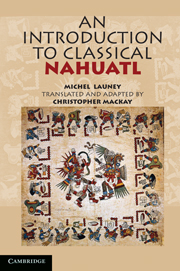Book contents
- Frontmatter
- Contents
- Preface
- How to Use This Book
- PART ONE
- PART TWO
- Lesson Sixteen Agent Nouns, the -ni Form
- Lesson Seventeen Compound Nouns, Verbal Incorporation
- Lesson Eighteen Bitransitive Verbs, Ambitransitive Verbs
- Lesson Nineteen Causative Verbs
- Lesson Twenty Applicative Verbs
- Lesson Twenty-One Honorific and Deprecatory Verbs
- Lesson Twenty-Two Pluperfect, Counterfactual, Vetitive, Directional Conjugations
- Lesson Twenty-Three Morphological Peculiarities of Certain Nouns and Verbs
- Lesson Twenty-Four More on Locatives
- Lesson Twenty-Five More on Quantifiers
- Lesson Twenty-Six Details about Number and Person, Indefinite Pronouns and Adverbs
- Lesson Twenty-Seven Compound Verbs
- Lesson Twenty-Eight Reduplication outside of the Plural, More on Verbs
- Lesson Twenty-Nine Derivative Verbs
- Lesson Thirty Derivative Nouns
- Lesson Thirty-One Noun Clauses
- Lesson Thirty-Two Attributives, Relative Clauses, Copula Verbs, Semi-Auxiliaries
- Lesson Thirty-Three Comparisons, Clauses of Result, Purpose and Cause
- Lesson Thirty-Four Conditions, More Particles
- Lesson Thirty-Five Temporal Clauses, Particles, Interjections
- Appendix One Traditional Orthography
- Appendix Two The Aztec Calendar
- Appendix Three Inflexional Patterns
- Appendix Four Key to the Exercises
- Nahuatl-to-English Vocabulary
- English-to-Nahuatl Vocabulary
- Index
Lesson Nineteen - Causative Verbs
Published online by Cambridge University Press: 05 June 2012
- Frontmatter
- Contents
- Preface
- How to Use This Book
- PART ONE
- PART TWO
- Lesson Sixteen Agent Nouns, the -ni Form
- Lesson Seventeen Compound Nouns, Verbal Incorporation
- Lesson Eighteen Bitransitive Verbs, Ambitransitive Verbs
- Lesson Nineteen Causative Verbs
- Lesson Twenty Applicative Verbs
- Lesson Twenty-One Honorific and Deprecatory Verbs
- Lesson Twenty-Two Pluperfect, Counterfactual, Vetitive, Directional Conjugations
- Lesson Twenty-Three Morphological Peculiarities of Certain Nouns and Verbs
- Lesson Twenty-Four More on Locatives
- Lesson Twenty-Five More on Quantifiers
- Lesson Twenty-Six Details about Number and Person, Indefinite Pronouns and Adverbs
- Lesson Twenty-Seven Compound Verbs
- Lesson Twenty-Eight Reduplication outside of the Plural, More on Verbs
- Lesson Twenty-Nine Derivative Verbs
- Lesson Thirty Derivative Nouns
- Lesson Thirty-One Noun Clauses
- Lesson Thirty-Two Attributives, Relative Clauses, Copula Verbs, Semi-Auxiliaries
- Lesson Thirty-Three Comparisons, Clauses of Result, Purpose and Cause
- Lesson Thirty-Four Conditions, More Particles
- Lesson Thirty-Five Temporal Clauses, Particles, Interjections
- Appendix One Traditional Orthography
- Appendix Two The Aztec Calendar
- Appendix Three Inflexional Patterns
- Appendix Four Key to the Exercises
- Nahuatl-to-English Vocabulary
- English-to-Nahuatl Vocabulary
- Index
Summary
Introduction to Causative Verbs
The causative construction in English involves an auxiliary verb of causation taking as its direct object the person being made to act plus an infinitive of that action: ‘I make/have/let him eat, I cause/compel/force/induce him to eat’. Instead of a construction with an auxiliary verb, Nahuatl creates a derivative version of the original verb with the suffixes -tia, -ltia (see details in a later discussion), and the new verb means ‘to cause (the object) to verb’: tzàtzītia ‘make shout’, yōlītia ‘make/let live’, cualtia ‘make eat, feed’, chīhualtia ‘have build’. Verbs formed in this way can be put in any tense.
Causative verbs have a predictable relationship with the verbs from which they are derived. If the verb ‘shout’ speaks only of the person shouting, to ‘make someone shout’ speaks of the person shouting and of the “causer” who makes that person shout, and if ‘eat’ speaks only of the eater and the thing eaten, to ‘make someone eat’ speaks in addition of a causer who makes someone eat. In other words, when the verb is changed from its simple form (i.e., the regular dictionary listing) to the causative, we have the following effects, which are similar in both English and Nahuatl:
intransitive verbs become transitive and transitive verbs become bitransitive.
the subject of the causative verb signifies the “causer”, and the term that would be the subject (and agent) of the simple verb becomes the direct object of the causative.
- Type
- Chapter
- Information
- An Introduction to Classical Nahuatl , pp. 189 - 201Publisher: Cambridge University PressPrint publication year: 2011



